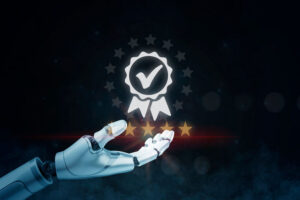Written by Scott Wilson

For anyone who has worked in the technology industry, professional certifications are a constant and important piece of the employment puzzle.
In a field where advances come practically overnight, where even the best college degree programs can’t foresee exactly where the next breakthroughs will happen, certification fills in the gaps in expertise along the way.
Now, the forefront of advances in the computer science world are coming in the field of artificial intelligence. Thousands of professionals working in or about to enter the industry need a way to make sure they are current, and to signal to employers they have the right skills and knowledge to succeed.
AI certification programs are evolving to help bridge that gap. For anyone starting a career in AI today, a professional certification is almost certainly in your future.





What Is AI Certification?
 If you’re still coming up through your essential college education in AI and ML, then you’re already aware of all the post-bachelor’s and post-master’s AI university certificate programs that exist to fill in knowledge gaps in specific areas of study. Consisting of a subset of college coursework, often offered with credit that can later be applied to a full degree, educational certificates offer a quick and inexpensive way to build skills in highly technical topics.
If you’re still coming up through your essential college education in AI and ML, then you’re already aware of all the post-bachelor’s and post-master’s AI university certificate programs that exist to fill in knowledge gaps in specific areas of study. Consisting of a subset of college coursework, often offered with credit that can later be applied to a full degree, educational certificates offer a quick and inexpensive way to build skills in highly technical topics.
Professional certifications fill a somewhat different role, despite the similar name and course requirements.
A professional certification may be offered in cooperation with a college or university, but the standards and terms are usually set by a private organization or company. In most cases, the subject of certification is tightly focused: it may revolve around a particular technique, programming tool, or technology platform offered by that company.
Are Skill Badges or Continuing Education Programs Considered AI Certifications?
 As you search through the various options for AI certs, you’ll come across a lot of material that doesn’t quite fit all the standard marks of a professional certification. These can include accomplishments like Google’s skill badges and stand-alone courses on various AI tools like TensorFlow. They can even include programs from colleges that are called “AI professional programs,” but that don’t clearly fit into either the educational certificate or professional certification worlds.
As you search through the various options for AI certs, you’ll come across a lot of material that doesn’t quite fit all the standard marks of a professional certification. These can include accomplishments like Google’s skill badges and stand-alone courses on various AI tools like TensorFlow. They can even include programs from colleges that are called “AI professional programs,” but that don’t clearly fit into either the educational certificate or professional certification worlds.
There are no certification naming police — any organization can call a program whatever it wants. And there are no rules about how and where you can build on your AI training… you may pick up critical tools and knowledge at a community hackathon event.
But what you are looking for with professional certifications are consistency and respectability. Employers and partners want to have a reliable third-party assessment of your skills. So, in general, no matter what they call it, any program that offers that assessment is a solid certification. Other courses, classes, or gold stars from any source may give you good information—but won’t stack up against legit certs from serious organizations.
Although you’ll certainly learn plenty of valuable information about that subject by earning a certification, the primary objective of certification programs is to validate your ability to use those tools or techniques. That makes professional certs particularly valuable to potential employers. A degree or certificate means you’ve been taught a general set of knowledge and skills, which may vary from school to school. But a certification tells them you’ve received a very specific kind of training and passed the tests to prove you’ve mastered it.
AI and Machine Learning Certifications are a Representation of Your Cumulative Knowledge and Skills
 That proof is the reason that corporations and research organizations have so much respect for professional certification in AI. It follows that the more rigorous the standards, the higher the level of respect and qualification you will achieve with a professional cert.
That proof is the reason that corporations and research organizations have so much respect for professional certification in AI. It follows that the more rigorous the standards, the higher the level of respect and qualification you will achieve with a professional cert.
Typically, AI certifications incorporate some combination of requirements that include:
- Completion of specific certification classes with minimum scoring requirements
- Passing a standardized test on the topic of certification
- Holding academic credentials to a specific level, and sometimes in a related field
- Accomplishing a certain number of years or hours of professional experience in the field
With some certifications, these requirements are mix-and-match. For example, someone who has earned a master’s degree may not have to show as much on-the-job experience as a candidate who holds only a bachelor’s degree.
Not every certification carries each of these requirement categories. In some cases, you may find that work experience is simply a recommendation, and that all you actually need to do is show up and pass the exam. In other cases, there’s no exam, and you will just have to attend and demonstrate knowledge from the certification classes.
What Organizations Offer Artificial Intelligence Certification Programs?
There’s massive demand for AI training around the world today. To meet that demand, there’s been a surge in AI certification programs coming from all kinds of different angles. The goals and intentions for these different certification providers can make a difference in both how broadly accepted the cert is in the industry and in how useful the training may be to you personally.
- First, you have the traditional sources of certification: independent third-party professional organizations who offer certs to verify and legitimize their profession. These include long-time stalwarts like ISACA and new and emerging groups like the United States Artificial Intelligence Institute.
- Second, you will find quite a few major technology companies that have bootstrapped their own AI-related certs. These are usually built around a tool or resource that a company offers or champions. They are designed to ensure that users have the necessary expertise and can be counted on to implement that tool effectively.
- A number of colleges and universities have started to offer professional certification, sometimes alongside similar educational certificate programs. These are sometimes offered through for-profit online learning platforms, such as those found in the next category, but sometimes conducted directly by the school. Their difference from educational certificates is that they typically offer CEU (Continuing Education Credits) rather than college credits, and they are aimed at working professionals who need a less formal knowledge update. As such, they don’t necessarily fill the same role as a professional certification, but may be valued by some employers.
- Similarly, there are for-profit educational organizations like Coursera that are stepping into the gap in AI education and providing quick-hit certification programs in AI. These aren’t really professional certifications in the sense of measuring your accomplishment, but they serve a role in helping to transition existing technology professionals over to an AI-enabled skillset.
Looking At the Best AI Certification Options for Your Career
Because professional certifications in AI are so narrowly tailored to certain skills, techniques, or tools, not every cert is valuable or even useful to every AI engineer.
Instead, it’s important to look at the state of the industry, your current skillset, and your career objectives when picking certs to pursue.
Some Caution Is Appropriate in Reviewing AI and ML Certification Programs for Professionals Today
 Artificial intelligence engineering is the Wild West of the technology industry. Out on the frontier, pushing forward across new mountain passes and into rich farmlands of fertile computational soil, it’s an exciting place to be.
Artificial intelligence engineering is the Wild West of the technology industry. Out on the frontier, pushing forward across new mountain passes and into rich farmlands of fertile computational soil, it’s an exciting place to be.
But with few stable settlements in place yet, it’s also a land where it pays to be wary. Hucksters and cons flow to places where riches are abundant, but where the local marshal hasn’t set up shop yet.
That means you need to be on the lookout for AI certification programs that over-promise and under-deliver. There are no rules against setting up an organization that claims to offer transformative AI certification but then delivers a few self-guided classes that rehash the most basic undergrad overview of the field along with an e-certificate that isn’t worth the pixels it’s printed on.
On top of keeping your eye out for scams, though, the frontier nature of AI education today also means you’ll need to pay attention to entirely new and legit certifications. The certs you see here will have competition in no time—make sure you continually assess the latest options to boost your career.
There are no certification naming police — any organization can call a program whatever it wants. And there are no rules about how and where you can build on your AI training… you may pick up critical tools and knowledge at a community hackathon event.
But what you are looking for with professional certifications are consistency and respectability. Employers and partners want to have a reliable third-party assessment of your skills. So, in general, no matter what they call it, any program that offers that assessment is a solid certification. Other courses, classes, or gold stars from any source may give you good information—but won’t stack up against legit certs from serious organizations.
The world of AI in general – and specifically the universe of AI degrees – has started to revolve around three major areas:
- Computer science-focused programs that stress fundamental research and core systems development
- Business-oriented programs that look for more applied uses of AI in a variety of fields and in governance
- Specialized niche uses of AI in highly technical fields like medicine and transportation that require unique combinations of in-depth knowledge
While professional certifications also reflect this reality to some extent, they are less cleanly divided between those areas. That’s because many of them deal with technologies or tools that are used in all three roles. For example, both Microsoft and Google offer professional AI certifications revolving around their cloud-based computational systems, as do Nvidia and Intel for their hardware. All these technologies can be the foundation of systems in any AI engineering category.
Professional AI Engineer Certifications Available Today
 In a fast-moving field like AI, there’s never going to be an exhaustive list of all the available professional certifications. Additionally, even of the various certs offered today, we’ve left out a few that just didn’t have the right track record or looked a little sketchy. That includes those from organizations that claim to offer AI certs that don’t require any coding skills. If it doesn’t involve programming, it’s not going to make you an AI scientist that anyone in the industry is going to pay attention to.
In a fast-moving field like AI, there’s never going to be an exhaustive list of all the available professional certifications. Additionally, even of the various certs offered today, we’ve left out a few that just didn’t have the right track record or looked a little sketchy. That includes those from organizations that claim to offer AI certs that don’t require any coding skills. If it doesn’t involve programming, it’s not going to make you an AI scientist that anyone in the industry is going to pay attention to.
We’ve also left out many certification programs in machine learning. Those are substantial and different enough to get their own page, even though many of them are excellent choices for AI professionals.
Still, you’ll find plenty to sink your teeth into in this list of professional certifications for AI engineers. To make sure you get off on the right track, we offer a little overview of the intention and requirements, and a link back to the certification website if you’d like to know more. We also provide the current costs, where available, although those are also subject to change.
Cost – $99
Covers:
- AI workloads and processing considerations on Microsoft’s Azure platform
- Fundamental principles of machine learning
- Features of computer vision processing
- Features of Natural Language Processing workloads
- Features of other generative AI workloads
Requires: Passing the Microsoft Azure AI Fundamentals Exam, a 40-60 question multiple choice exam that must be completed in 180 minutes
Cost – $165
Covers:
- Planning and managing AI solutions with the Azure platform
- Implementing decision support solutions
- Implementing computer vision solutions
- Implementing natural language processing solutions
- Implementing knowledge mining solutions
- Implementing generative AI system
Requires: Passing the Designing and Implementing a Microsoft Azure AI Solution exam, a 40-60 question multiple choice exam that must be finished within 2 hours
Cost – $49/month Coursera subscription
Covers:
- Machine learning in Python
- Scalable ML in Big Data environments with Spark
- Deep learning and neural networks with PyTorch
- Building deep learning models with TensorFlow
- Understanding back propagation for weight and bias tuning, execution pipelines, and recursive neural networks
Requires: A series of badges in the above knowledge areas must be earned together with the Data Science Professional Certificate from Coursera and an AI Capstone Project with Deep Learning demonstrating an ability to complete advanced ML projects. Expected to take 4-6 months to complete
Cost – Free
Covers:
- Two tracks: Specialist and Ambassador
- Setting up the Jetson Nano and accessing JupyterLab
- Using PyTorch to train deep neural networks for image classification
- Training image regression algorithms for object detection
- Beginning robotics applications
Requires: Submission and acceptance of a final project based on course instruction and technologies. Ambassador level certification further requires completing and passing an interview process
Cost – Free
Covers:
- Developing deep learning applications using inference
- Deploying pre-trained computer vision models
- Model testing and optimization
- Development with platforms like TensorFlow, PyTorch, and ONNX
Requires: Completing coursework, hands-on exercises, and passing assessments
Cost – $691
Covers:
- AI conceptual overview
- Machine learning essentials and Python programming
- TensorFlow applications in deep learning processes
- Deep reinforcement learning policies and methods
- Computer vision and generative adversarial networks
- Natural Language Processing in Python
- Monte Carlo methods in reinforcement learning
- Bellman equation and dynamic programming
Requires: Associate in a STEM field with 2 years programming experience OR a bachelor’s degree with basic programming proficiency AND pass a 60-question examination within a 100-minute time limit
Cost – $550
Covers:
- Essentials of AI and machine learning, including the AI ecosystem and three types of ML learning
- Essentials of AI and ML programming, including logic, heuristics, and genetic algorithms—includes practical build projects for games and recommendation systems
- Natural language processing development and applications, with speech recognition and object detection and tracking
- Deep learning and neural networks, including convolutional neural networks
Requires: Associate degree in a STEM field plus 2-years work history in computing OR a bachelor’s or higher level degree AND passing the AiE™ exam covering 48 themes in 4 required knowledge segments
Cost – $144 (exam only; optional courses may total $464)
Covers:
- AI principles, models, and infrastructure fundamentals
- Machine learning models, security implementations, and robotic process automation
- AI risks and ethical considerations
- Essential software and algorithms using in AI applications
Requires: Passing a 2-hour online exam combining multiple choice and performance-based questions on AI concepts and implementation. The AI certificate is only 1 of 4 required certificates that make up the complete CET certification.
Cost – Cost Varies
Covers:
- Artificial Intelligence Foundation Certification
- Certified Machine Learning Associate Certification
- Certified Artificial Intelligence Expert Certification
- Certified Deep Learning Expert Certification
- Certified Natural Language Processing Expert Certification
- Certified Computer Vision Expert Certification
Requires: Examination; some certifications require passing prerequisite knowledge tests before the main exam can be pursued
Some Great AI Engineer Certifications Aren’t in AI at All
 Something else to contend with in the AI certification world is that many of the best certifications you can get to build your AI proficiency aren’t necessarily in AI at all. See the link above to our separate professional machine learning certification guide.
Something else to contend with in the AI certification world is that many of the best certifications you can get to build your AI proficiency aren’t necessarily in AI at all. See the link above to our separate professional machine learning certification guide.
It’s widely recognized that ML is an important technology component within the field of AI as well as a tool useful in other fields. But something similar is true of a variety of other technologies and platforms.
Since AI will impact all kinds of industries and technical professions, AI engineers can benefit from certifications that come from those worlds, too.
For example, there are a variety of existing certifications in Robotic Process Automation that cross over into AI territory at times. Professional certifications in Python programming can help demonstrate your coding expertise. Various certifications in data science may help show your chops in working with large streams of data of the sort that are common in training transformer architectures for natural language processing and computer vision.
Since many AI training systems run on cloud platforms, certifications like Amazon’s AWS certifications can help you prepare. While both Google and Microsoft have AI or ML specific certs, they also offer general Cloud and Azure certifications that may prove useful.
Particularly when it comes to professional specialists and positions working in business applications of AI, you’re going to want certs that reflect the biggest challenges in those fields. For example, AI engineers working in cybersecurity are very likely to benefit from a Security+ certification, or the Cisco Certified Network Professional Security cert. Other specialized fields, like radiology, come with their own highly respected board certifications, which take professional expertise and recognition to new levels. Many are even required to work in those fields.
Pursuing AI Certification Online
Just due to the industry and the status of people looking for professional certification, these programs are offered entirely online. Because you are going to be mid-career, and usually already deeply involved in your current role, you need an option where you can:
- Study on your own time, and at different times of day on different days, to fit your busy schedule
- Tap into course materials, streaming lectures, and connect with classmates or instructors from anywhere you can get an internet connection
- Avoid having to travel to get to any required classes, even if it’s in your area
Professional certifications are built with professionals in mind and offer all these features. Additionally, some come with access to resources and reference materials that you can continue to tap into throughout your career. Online options are really the only way to go.
AI Certification Salary: Pay Bumps that Come with AI Certification Are Common but Tough to Measure
 For the basic reason that AI is everywhere right now, and that there just aren’t many people with real AI skills at this very early phase of the AI revolution, it’s wickedly difficult to establish salary levels for AI professionals. The jobs haven’t existed for long enough and the Bureau of Labor Statistics, the go-to resource for employment and salary data, hasn’t defined AI-specific jobs yet.
For the basic reason that AI is everywhere right now, and that there just aren’t many people with real AI skills at this very early phase of the AI revolution, it’s wickedly difficult to establish salary levels for AI professionals. The jobs haven’t existed for long enough and the Bureau of Labor Statistics, the go-to resource for employment and salary data, hasn’t defined AI-specific jobs yet.
Instead, those positions tend to fall into already-established roles like these:
- Computer and Information Research Scientists - $232,010
- Computer Hardware Engineers - $208,200
- Computer Systems Analysts - $161,980
- Computer Programmers - $157,690
- Software Developers, Quality Assurance Analysts, and Testers - $159,740
- Data Scientists - $174,790
The numbers above represent the baseline for top ten percent of such positions overall, with some in those roles earning considerably more,
The best that can be said is that AI-related jobs are probably going to command somewhere in the top percentage of those categories. And holding a professional certification will only build on top of that already high level.
2022 US Bureau of Labor Statistics salary and employment figures for Computer and Information Research Scientists, Data Scientists, Computer Programmers, and Software Developers, Quality Assurance Analysts, and Testers reflect national data, not school-specific information. Conditions in your area may vary. Data accessed January 2024.






